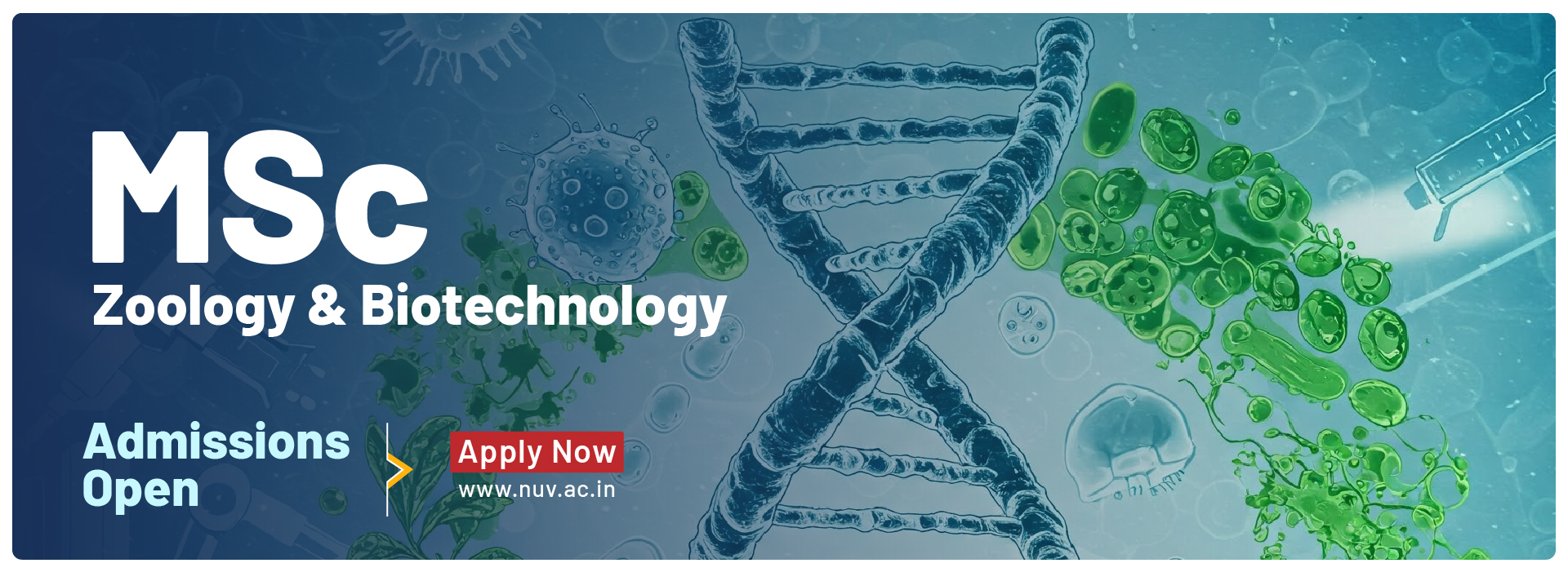The Master of Science (MSc) in Zoology & Biotechnology is a comprehensive and flexible program designed to provide students with a profound understanding of the fundamental principles and practical applications within the fields of animal biology and biotechnology. The program is structured around mandatory courses, discipline-specific electives, and university electives, ensuring a well-rounded, interdisciplinary education. The compulsory area includes internships and a 6-month dissertation as a master’s project, while university electives are chosen from a specified catalogue to acquire additional technical, interdisciplinary, and professional skills. Elective modules can be selected from the entire range of courses offered across Navrachana University (NUV), allowing students to tailor their academic journey to their interests and career goals.
The core courses form the bedrock of the program, providing students with a solid grounding in essential topics such as Advanced Zoology, Cell and Molecular Biology, Genetics and Genomics, Animal Physiology, Biochemistry, and Research Methodology in Life Sciences. These foundational courses lay the groundwork for a deeper exploration of specialised tracks, enabling students to customise their academic path based on individual interests and career aspirations.
Students can choose from distinct pathways to focus their studies within the specialised tracks. The Animal Biotechnology and Genomics track delves into areas such as Recombinant DNA Technology, Animal Cloning and Transgenics, and Advanced Genomics. The Wildlife Biology and Conservation track offers courses like Wildlife Ecology, Conservation Genetics, and Biodiversity Management. For those interested in Marine Biology and Aquatic Biotechnology, the track includes courses such as Marine Ecosystems, Aquatic Biotechnology, and Fisheries Science.
The program strongly emphasises practical training and research, offering laboratory work, field studies, and opportunities to engage in collaborative research projects with faculty or industry partners. Advanced elective courses allow students to further tailor their education by selecting topics that align with their specific interests, such as Immunology and Disease Biology, Developmental Biology, Ecotoxicology, or Bioinformatics.
A series of seminars on innovative topics in zoology and biotechnology provides students with exposure to the latest developments in the field. The capstone experience involves presenting research findings in a public forum, highlighting the culmination of a student’s academic journey.
Complementing the academic curriculum focuses on professional development, including career development workshops, networking events with industry professionals, and optional internships. The program also incorporates a mobility window, providing opportunities for international collaboration or participation in exchange programs, further broadening students’ global perspectives.
The culmination of the MSc in Zoology & Biotechnology is marked by the successful completion and defence of a dissertation thesis, where students conduct independent research under the guidance of faculty mentors. This research project demonstrates their ability to address complex challenges in zoology and biotechnology, contributing meaningfully to advancing knowledge in the field.
Graduates emerge from the program with a solid foundation in animal sciences, specialized expertise in their chosen track, and the practical skills necessary for success in the dynamic and evolving landscape of zoology and biotechnology. Equipped to tackle global challenges in animal conservation, health, and sustainability, they are prepared to excel in diverse career paths, including research, industry, conservation, and academia. Through its innovative curriculum, research opportunities, and professional development initiatives, the program positions students at the forefront of these disciplines, ready to make meaningful contributions to science and society.


